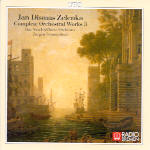This disc completes Jürgen Sonnentheil’s excellent survey of Zelenka’s complete orchestral works. The highlight is a stunning rendition of Capriccio IV, capped by some pretty amazing playing of its insanely high horn parts. The work has all the melodic, harmonic, and textural interest that makes this composer one of the most characterful voices of the Baroque era. The Ouverture a 7 Concertanti doesn’t sport the same colorful array of instruments as the Capriccio, but the music has personality in abundance, especially the delicious concluding Folie. Sonnentheil also offers a special treat in the form of the overture to Zelenka’s Melodrama de S. Wenceslao (complete recording due in 2001 from Supraphon). Typically, it features some remarkably independent writing (given the period) for two trumpets and timpani. Throughout this series, the playing of Das Neu-Eröffnete Orchestre on period instruments has combined vitality with both warmth and elegance, a far cry from the steely cold sound of many UK period instrument bands. A fine conclusion, then, to a wonderful series, beautifully recorded by the engineers of Radio Bremen.
































